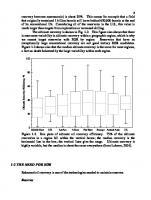Enhanced oil recovery. 2, Processes and operations 0444416250, 9780444416254, 0444422064, 0444429336
This is the first part of a two-volume work which comes at a time when oil producers are taking a close look at the econ
244 32 179KB
English Pages 729 Year 1989
Table of contents :
Fundamentals of Fractured Reservoir Engineering......Page 4
Copyright Page......Page 5
List of Contents......Page 12
First Part: Reservoir Description......Page 20
1.1. Introduction......Page 24
1.2. Geological conditions of fracturing......Page 26
1.3. Geological model for the simulation of fracturing......Page 43
1.4. Influence of stylolitization and jointing......Page 49
1.5. Quantitative evaluation of fracturing......Page 57
List of Symbols......Page 68
References......Page 69
2.1. Classification and definitions......Page 70
2.2. Basic parameters of fractures......Page 73
2.3. Direct evaluation of fracturing......Page 85
2.4. Processing of data......Page 103
2.5. Application of fracturing studies......Page 114
List of Symbols......Page 127
References......Page 128
3.1. Fractured carbonate reservoirs......Page 130
3.2. Fractured silt/sand reservoirs......Page 150
3.3. Fractured shale reservoirs......Page 155
3.4. Fractured ‹‹ basement ‹‹ reservoirs......Page 161
4.2. Porosity......Page 166
4.3. Permeability......Page 175
4.4. Discussion concerning basic parameters (K, φ, Swi)......Page 195
4.5. Compressibility in a fractured rock......Page 218
4.6. Relative permeability in a fractured reservoir......Page 227
4.7. Capillary pressure curve......Page 252
5.1. Introduction......Page 274
5.2. Lithology logs......Page 275
5.3. Caliper logs......Page 276
5.4. Temperature logs......Page 277
5.5. Resistivity logs......Page 279
5.6. Dipmeter logs......Page 283
5.7. Porosity logs......Page 289
5.8. Borehole televiewer......Page 302
5.9. Discussion......Page 305
5.10. Quantitative interpretation......Page 309
List of Symbols......Page 312
References......Page 313
SECOND PART: Well Dynamics Flow of Homogeneous Fluids Toward A Well......Page 314
6.1. Law of flow of homogeneous liquids......Page 318
6.2. Steady-state flow of homogeneous liquids through fractures toward a well......Page 330
6.3. Flow of gas through fractures toward a well......Page 357
6.4. Transient flow in a non-porous fractured rock......Page 366
List of Symbols......Page 369
References......Page 370
CHAPTER 7. FLOW TOWARDS A WELL IN FRACTURED ROCK OF DOUBLE POROSITY......Page 372
7.1. Basic equations of flow......Page 374
7.2. Discussion of the Warren and Root1 model......Page 394
7.3. Discussion of Pollard method......Page 426
List of Symbols......Page 434
References......Page 436
8.2. Well interference......Page 438
8.3. Evaluation of anisotropy in a fractured reservoir......Page 453
8.4. Use of type-curves for analysis of flow toward a well......Page 472
List of Symbols......Page 477
References......Page 478
THIRD PART : Reservoir Dynamics......Page 480
9.2. Simplified dynamic approach to matrix fluid displacement......Page 484
9.3. Simplified physical approach to fluid displacement in matrix block......Page 501
9.4. Concepts and experiments : single block imbibition displacement......Page 514
9.5. Other aspects of single block fluid displacement......Page 549
9.6. Oil produced from a single block : theoretical approach......Page 555
List of Symbols......Page 566
References......Page 567
10.1. Introduction......Page 570
10.2. Reservoir description during depletion......Page 573
10.3. Reservoir zoning vs. production mechanism......Page 579
10.4. Specific aspects of a fractured reservoir......Page 613
List of Symbols......Page 622
References......Page 624
11.1. Introduction......Page 626
11.2. Phase flow simulation......Page 627
11.3. Compositional simulators......Page 651
List of Symbols......Page 658
References......Page 659
12.1. Basic data and history of certain fractured reservoirs......Page 660
12.2. Simplified examples of reservoir calculations......Page 670
List of Symbols......Page 722
References......Page 724
SUBJECT INDEX......Page 726
Fundamentals of Fractured Reservoir Engineering......Page 4
Copyright Page......Page 5
List of Contents......Page 12
First Part: Reservoir Description......Page 20
1.1. Introduction......Page 24
1.2. Geological conditions of fracturing......Page 26
1.3. Geological model for the simulation of fracturing......Page 43
1.4. Influence of stylolitization and jointing......Page 49
1.5. Quantitative evaluation of fracturing......Page 57
List of Symbols......Page 68
References......Page 69
2.1. Classification and definitions......Page 70
2.2. Basic parameters of fractures......Page 73
2.3. Direct evaluation of fracturing......Page 85
2.4. Processing of data......Page 103
2.5. Application of fracturing studies......Page 114
List of Symbols......Page 127
References......Page 128
3.1. Fractured carbonate reservoirs......Page 130
3.2. Fractured silt/sand reservoirs......Page 150
3.3. Fractured shale reservoirs......Page 155
3.4. Fractured ‹‹ basement ‹‹ reservoirs......Page 161
4.2. Porosity......Page 166
4.3. Permeability......Page 175
4.4. Discussion concerning basic parameters (K, φ, Swi)......Page 195
4.5. Compressibility in a fractured rock......Page 218
4.6. Relative permeability in a fractured reservoir......Page 227
4.7. Capillary pressure curve......Page 252
5.1. Introduction......Page 274
5.2. Lithology logs......Page 275
5.3. Caliper logs......Page 276
5.4. Temperature logs......Page 277
5.5. Resistivity logs......Page 279
5.6. Dipmeter logs......Page 283
5.7. Porosity logs......Page 289
5.8. Borehole televiewer......Page 302
5.9. Discussion......Page 305
5.10. Quantitative interpretation......Page 309
List of Symbols......Page 312
References......Page 313
SECOND PART: Well Dynamics Flow of Homogeneous Fluids Toward A Well......Page 314
6.1. Law of flow of homogeneous liquids......Page 318
6.2. Steady-state flow of homogeneous liquids through fractures toward a well......Page 330
6.3. Flow of gas through fractures toward a well......Page 357
6.4. Transient flow in a non-porous fractured rock......Page 366
List of Symbols......Page 369
References......Page 370
CHAPTER 7. FLOW TOWARDS A WELL IN FRACTURED ROCK OF DOUBLE POROSITY......Page 372
7.1. Basic equations of flow......Page 374
7.2. Discussion of the Warren and Root1 model......Page 394
7.3. Discussion of Pollard method......Page 426
List of Symbols......Page 434
References......Page 436
8.2. Well interference......Page 438
8.3. Evaluation of anisotropy in a fractured reservoir......Page 453
8.4. Use of type-curves for analysis of flow toward a well......Page 472
List of Symbols......Page 477
References......Page 478
THIRD PART : Reservoir Dynamics......Page 480
9.2. Simplified dynamic approach to matrix fluid displacement......Page 484
9.3. Simplified physical approach to fluid displacement in matrix block......Page 501
9.4. Concepts and experiments : single block imbibition displacement......Page 514
9.5. Other aspects of single block fluid displacement......Page 549
9.6. Oil produced from a single block : theoretical approach......Page 555
List of Symbols......Page 566
References......Page 567
10.1. Introduction......Page 570
10.2. Reservoir description during depletion......Page 573
10.3. Reservoir zoning vs. production mechanism......Page 579
10.4. Specific aspects of a fractured reservoir......Page 613
List of Symbols......Page 622
References......Page 624
11.1. Introduction......Page 626
11.2. Phase flow simulation......Page 627
11.3. Compositional simulators......Page 651
List of Symbols......Page 658
References......Page 659
12.1. Basic data and history of certain fractured reservoirs......Page 660
12.2. Simplified examples of reservoir calculations......Page 670
List of Symbols......Page 722
References......Page 724
SUBJECT INDEX......Page 726

- Author / Uploaded
- Erle C Donaldson
- George V Chilingarian
- Teh Fu Yen
- Similar Topics
- Technique
- Oil and Gas Technologies

![Hybrid Enhanced Oil Recovery Processes for Heavy Oil Reservoirs [1 ed.]
0128239549, 9780128239544](https://ebin.pub/img/200x200/hybrid-enhanced-oil-recovery-processes-for-heavy-oil-reservoirs-1nbsped-0128239549-9780128239544.jpg)





![Principles of Enhanced Oil Recovery [1st ed. 2023]
9819901928, 9789819901920](https://ebin.pub/img/200x200/principles-of-enhanced-oil-recovery-1st-ed-2023-9819901928-9789819901920.jpg)
![Fundamentals of Enhanced Oil Recovery [1 ed.]
9781613994078, 9781613993286](https://ebin.pub/img/200x200/fundamentals-of-enhanced-oil-recovery-1nbsped-9781613994078-9781613993286.jpg)